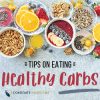Atkins. South Beach. Paleo. Keto. Different diet names with the same (basic) game. You’ve heard of them. Maybe you’ve tried them.
There’s a ton of information out there, whether online or from the pamphlets of health professionals. It can get pretty overwhelming. Unfortunately, tangled in all of this material, misconceptions linger.
If you’re not a nutritionist or haven’t pursued a low-carbohydrate diet before, from the outside it may seem counterintuitive to dive into the carb-limiting health kick, as many healthy and vital food groups, such as fruits and vegetables, technically contain higher carb counts than say, a slab of steak.
And doesn’t everything contain carbs? How can one possibly eliminate them altogether? In short, you can’t. Carbs are our energy source! And truthfully, you don’t necessarily have to severely reduce your carb intake, as long as you’re primarily consuming the beneficial kind of carbs.
That said, if you live with certain medical conditions—such as diabetes—that require some carb watching/counting, then your individual lifestyle may come with its own dietary rules, depending on your age, schedule, fitness level, allergies, medical history, insulin intake method (if applicable), etc. So please consult your physician, and take all online health advice with a grain of salt!
Here’s a brief breakdown of the basic carb categories:
Simple (also known as “fast” carbs) – These can include healthier, naturally occurring sugars, like in fruit. But they’re also found in what you’ve maybe considered “bad” carbs, like sweets and processed foods. Even a regular loaf of bread found in your grocery store contains sugar, regardless of what the front packaging may claim.
Simple carbs or simple sugars are processed in the body faster than complex carbs, and while they may provide an energy rush, this doesn’t last, and the blood sugar level can drop radically again, leaving you hungry. Erratic jumps and drops in blood sugar can cause adverse health conditions over time, such as heart disease. Simple sugars also have a dangerous addictive quality to them.
Luckily, there are easy ways to cut down on simple sugars—particularly cane sugar—in even the most basic household grocery items, like bread or peanut butter.
Always check the ingredient list! Sadly, many companies have no real conscience when it comes to misleading customers and selling more products. While an item may sound healthy with claims like, “no high fructose corn syrup,” “whole-grain,” or “low fat,” those items can still contain high levels of cane sugar. However, the ingredient list on the back of the packaging doesn’t lie. Try looking for items made without added sugar, like natural peanut butter.
Hint: not all peanut butters labeled “natural” are good for you! True natural peanut butter contains only two or three ingredients: peanuts and salt.
For bread, look for the “sprouted whole grain” kind, which allows the grain to fully sprout before being milled into flour. It’s more nutritious, fiber-packed, and less processed. The Ezekiel brand, found in most supermarket freezer sections, is a popular option conveniently devoid of sugar.
For a sweet fix, try natural honey or applesauce (without added sugar). There are also many interesting and delicious dessert recipes on the internet that utilize these products as cane sugar replacements. While a healthier, less sugary lifestyle may seem unappealing at first, give it a chance! You don’t have to live trapped in a food or sugar addiction.
All that said, healthy simple carbs, like fruits, are always beneficial in some moderation, depending on your dietary needs and/or any digestive issues you may have. You should aim to get most—if not all—of your simple carbs from fruit, rather than processed foods.
Complex (also known as “slow” carbs) – These include both starches and non-starches. Here are a few examples:
• Potatoes
• Corn
• Spinach
• All different types of beans
• Unrefined, whole-grain pastas and breads, such as the aforementioned sprouted whole-grain
• Brown rice
• Peas
• Broccoli
• Traditional, old-fashioned oatmeal (not the pre-packaged, sugary kind)

As you’ve probably already guessed, in contrast to simple carbs, the body’s process for converting complex carbs into energy goes much slower than that of simple carbs. This keeps you fuller for longer, and wards off binge-eating and food addiction.
Complex carbs contain a multitude of other benefits, like vitamins, minerals, and high fiber content—the latter of which is lacking in the typical American’s diet. In fact, nutritionists and other health professionals across the country have coined the inadequate fiber intake issue as “the fiber gap,” on account of Americans consuming too many processed food products instead of fruits, vegetables, nuts, and seeds. Fiber is known for aiding your digestive health, but along with that, it reduces the risk of an array of health conditions, such as high cholesterol, strokes, heart attacks, type 2 diabetes, obesity, and certain types of cancers.
In essence…
Aim to consume more healthy fiber! Reduce your intake of simple carbs from processed foods. But don’t misinterpret a low-carb as an excuse to shoot off in the opposite direction and overdo it with meat protein. There is a balance that can be struck on this spectrum.
An excess of animal protein is not healthy for the body. Animal proteins can contain high levels of saturated fat and cholesterol—even in leaner meats—and promote addictive eating habits for many people. Studies have also shown significant correlations between diets high in animal protein and the development of cancer and type 2 diabetes. According to the Physicians Committee for Responsible Medicine, “people eating large amounts of animal protein are 23 times the risk of death from diabetes and 5 times the risk of death from cancer as those consuming less protein.”
While a healthy diet does not necessarily warrant going meat-free, if you’re interested in pursuing vegetarianism or veganism, there are plenty of resources on the internet and elsewhere to boost your motivation for this lifestyle change. For example, Atlanta-based, Dr. Oz-Show-featured chiropractor and nutritional guru, Dr. Joe Esposito, sheds valuable insight on the health risks and issues of consuming meat in his blog, radio show, and practice.
Another good way to get protein is through tofu. Don’t knock it until you try it—and make sure to try it right! Tofurkey is a delicious, high-quality brand. Try their Italian or spinach pesto “sausage” chopped up with olive oil, black olives, garlic, and shredded parmesan in a (preferably whole-grain) pasta dish. Can almost guarantee you won’t notice the difference.
Ultimately, while it’s important to be a healthy and mindful consumer of what you’re putting into your body and how it affects you mentally and physically, nutrition is not so black-and-white, and developing an all-or-nothing attitude to certain food groups can become very dangerous. There are no “bad” foods, just areas to practice caution and moderation. Food doesn’t need to be associated with shame or sin. You’re only human.
If you found an error, highlight it and press Shift + Enter or click here to inform us.



